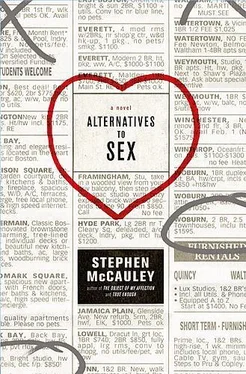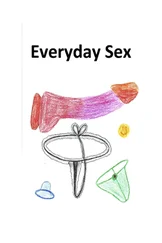The car windows fogged up as soon as I closed the door behind me. On the passenger seat, there was a paper with my handwritten directions to Carlo’s apartment. A reminder of past mistakes. I ripped it in half and put it in the trash container I had Velcroed to the dashboard. I felt lighter and calmer already. Breathe in, breathe out. I couldn’t imagine why I hadn’t thought of abstinence sooner. I sat for a moment folded up in the driver’s seat with the engine idling and my eyes closed. I pictured returning to the driveway after work, walking into the house, and picking the book off my night table. The Mandarins. Excellent title. I had a clear image of it in my mind. I felt relaxed and in control of my life as I walked to the chaise longue in the corner of my bedroom, turned on the light, and began to read. These were pleasures I’d enjoyed in the recent past, and with a little discipline, they would be mine again. I’d had a year of posttraumatic self-indulgence, and now it was time to move on. I opened the glove compartment, stuffed my mobile supply of condoms into the trash container, and backed out of the driveway. It was going to be a very good day.
It had been a dry summer, and that morning’s rain, far from being an annoyance, was a welcome novelty, a suggestion that nature was, perhaps, getting back on a path of normalcy. And maybe, therefore, life in general would resume a normal rhythm at some point.
I’d been at my desk for about an hour when I looked up to enjoy the sight of Massachusetts Avenue being washed by a suddenly fierce downpour and saw two people huddled under a large black umbrella gazing at the real estate listings posted in the window of the office. Given the position of the umbrella, I couldn’t see their faces, but there was something about the way they were leaning in toward each other and wearing twin raincoats that made me think they were either headed for or had just come from next door, a brick building affectionately referred to as the Nut House because so many shrinks had offices there. I was familiar with the place, having spent a few afternoons in it myself a number of years ago. Fortunately, I was declared cured after a mere eight sessions, on the very day that my insurance coverage ran out.
The Nut House was a boost to businesses in the neighborhood. People were always rushing from their shrink appointments and heading to a bakery around the corner or the restaurant across the street to binge on instant gratification. Or coming into Cambridge Properties to signal a change in their lives by buying a new place to install their familiar miseries.
“What do you think?” I said aloud. “Headed to see their couples counselor, or just on their way out?”
Deirdre Fisk, occupant of the desk next to mine, leaned away from her computer and peered out the window. I glanced at her screen and saw that she was shopping online for ceiling fans. Deirdre, an extremely successful saleswoman, spent a lot of her time in the office shopping for overpriced appliances, face creams made by eastern European countesses, handcrafted furniture, and antique wallpaper. She was disappointed in nearly every item she bought via the computer (I could relate to this) and always ended up sending it back.
“I couldn’t tell you,” Deirdre said. “I can’t get past the outfits. I hate couples who dress alike. And raincoats with belts? Hor-rible. They’re probably one of those smug, self-satisfied couples who go around advertising how unhappy and discontented they are to any sap who’ll listen. ‘We’re about to get a divorce.’ ‘He’s an abusive drunk.’ They’re always so proud of themselves. You have no idea how hurtful it is.”
I confessed that I hadn’t noticed the belts, but otherwise found the raincoats dashing. It was a mistake to venture into the subject of clothes with Deirdre. She loved talking about clothing and generally had scathing views that she delivered with intimidating authority. Shortly after she came to the office two years earlier, I started paying a lot more attention to my own wardrobe, hoping to avoid her scorn. I’d developed a friendly relationship with the owner of a consignment shop in Boston who called me up whenever he got in anything that might fit my tall, skinny body.
It was also a mistake to bring up the subject of couples around Deirdre. In terms of age, she lived in my untrendy, forty-something neighborhood and had been married to a homely, arrogant lawyer named Raymond for nearly twenty years. The central problem in her life (her version) was that she and Raymond were, and always had been, too compatible, too much in love, too damned happy. According to Deirdre, people snubbed you socially, condescended to you intellectually, and questioned the depth of your emotions if you were happily married. It didn’t help that she generally worked with divorcing couples funneled to her by Raymond.
The man shook the rain out of his big black umbrella, held the door open for the woman in a courtly way, and the two entered. It was close to lunchtime and Deirdre and I were the only ones in our small office, one of the few independent real estate offices in town that hadn’t been gobbled up by a conglomerate.
“Do you want to help them, or should I?” I asked Deirdre.
“I was just about to go out and buy a soda,” she said, code for huddling in the alley behind the building and smoking. She pushed herself back from her desk. “You take them. I’m not in the mood to listen to them bragging about how close they are to divorce. You can deal with it better than I can, being single and all.”
When it comes to dealing with gay colleagues, most people follow a Don’t Ask policy, as if posing a question about dating or romantic interests would be unacceptably invasive. In all the years I’d been working at Cambridge Properties, no one had ever questioned me about my social life, and although I was open with everyone in a general way, I’d never shared a detail of same, aside from occasionally dropping the name of a man I might be dating into a conversation, something that had never produced a single follow-up question. This situation made me feel inferior to my coworkers—a bit like a maiden aunt with no prospects—and oddly enough, simultaneously superior, as if I had a wildly sophisticated private life that was above the tedium of marital squabbles and framed photographs of smiling spouses.
Being single and all, I took on the couple, and Deirdre went out for her Marlboro Ultra Light.
“We’re not looking aggressively,” the man said. “I should tell you that right off, just so you’ll know. I don’t want you to end up feeling you wasted your time with us.”
We were standing in front of the empty reception desk near the door, and the man was having a tough time figuring out what to do with his dripping umbrella. Polite to a fault. An attractive fault. I like people who make an effort with the small details of everyday manners, holding open doors, not dripping all over your carpets, saying thank you for insignificant favors.
I was convinced that manners were a dying, possibly dead art, the victim of talk radio and a growing suspicion that anything less than all-out bullying was an admission of weakness, an open invitation to telemarketers and suicide bombers.
“Don’t worry about my time,” I said. “In the end, it’s a lot less work for me if you don’t buy anything. You’ll be doing me a favor.”
He grinned at me. “I feel better already.”
He was a good-looking man with the sculpted face of an aging runner. His graying hair was brushed straight back off his forehead and slicked down close to his scalp, the lines of the comb clearly delineated. He was dressed and groomed—a dark suit under the now-open raincoat and that arranged hair—as if he was about to appear in court or make an important presentation, and so I wasn’t surprised later when I learned that he was that profitable, nebulous thing, a business consultant. There was something in his manner—confidence mixed with empathic generosity—that made me certain he’d grown up with advantages he wasn’t afraid of having taken away from him.
Читать дальше












